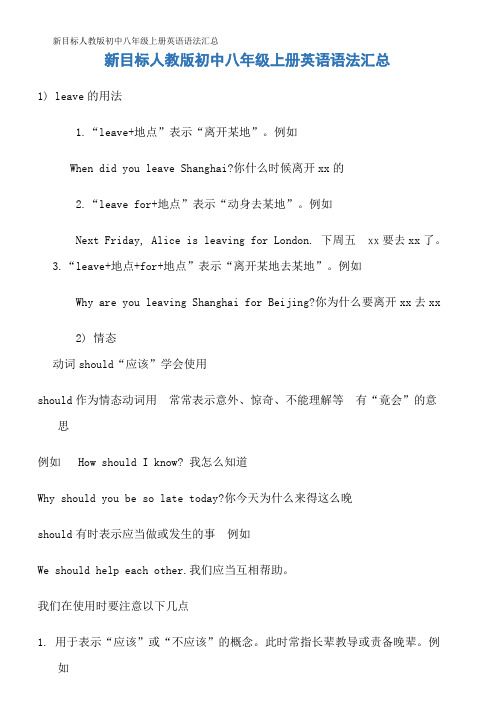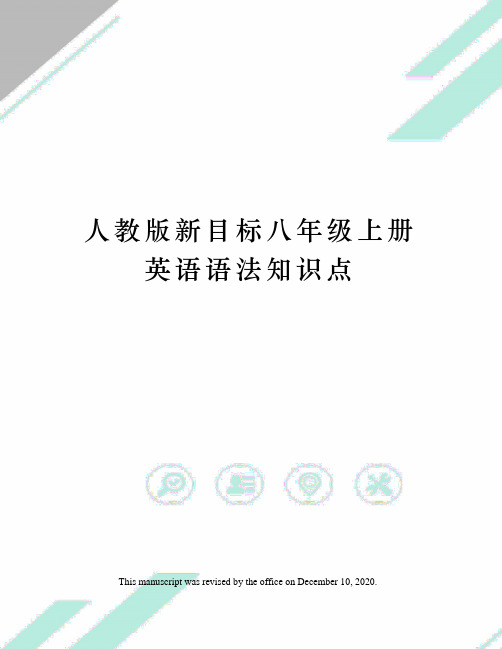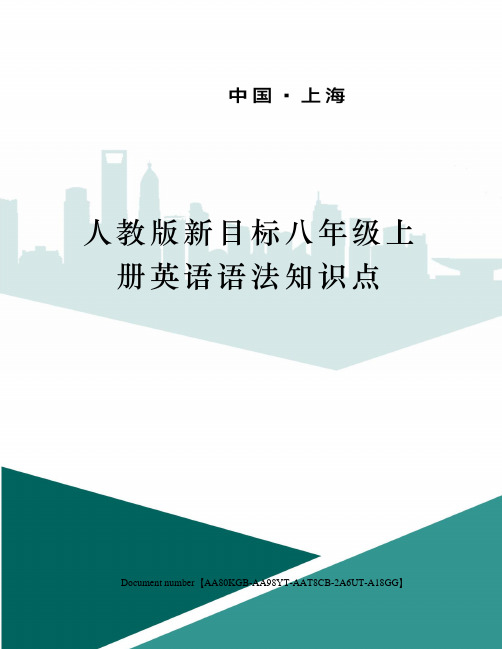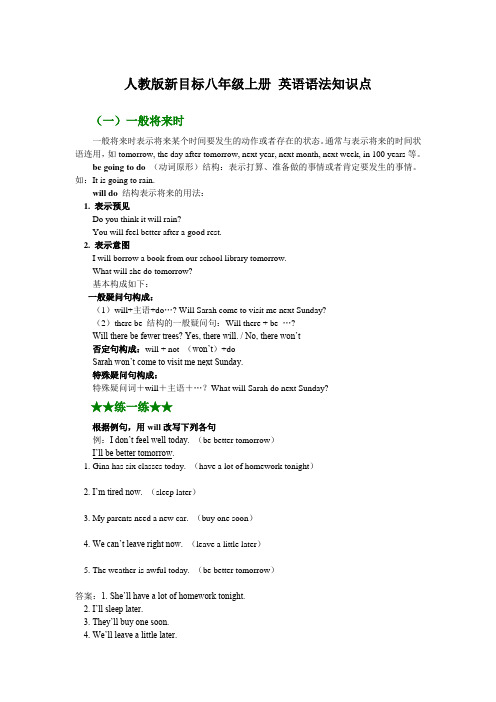Removed_新目标人教版初中八年级上册英语语法汇总
- 格式:pdf
- 大小:202.44 KB
- 文档页数:13

新目标人教版初中八年级上册英语语法汇总1) leave的用法1.“leave+地点”表示“离开某地”。
例如When did you leave Shanghai?你什么时候离开xx的2.“leave for+地点”表示“动身去某地”。
例如Next Friday, Alice is leaving for London. 下周五要去xx了。
3.“leave+地点+for+地点”表示“离开某地去某地”。
例如Why are you leaving Shanghai for Beijing?你为什么要离开xx去xx2) 情态动词should“应该”学会使用should作为情态动词用常常表示意外、惊奇、不能理解等有“竟会”的意思例如 How should I know? 我怎么知道Why should you be so late today?你今天为什么来得这么晚should有时表示应当做或发生的事例如We should help each other.我们应当互相帮助。
我们在使用时要注意以下几点1. 用于表示“应该”或“不应该”的概念。
此时常指长辈教导或责备晚辈。
例如You should be here with clean hands. 你应该把手洗干净了再来。
2. 用于提出意见劝导别人。
例如You should go to the doctor if you feel ill. 如果你感觉不舒服你最好去看医生。
3. 用于表示可能性。
should的这一用法是考试中常常出现的考点之一。
例如We should arrive by supper time. 我们在晚饭前就能到了。
She should be here any moment. 她随时都可能来。
3) What...? 与 Which...?1. what 与 which 都是疑问代词都可以指人或事物但是what仅用来询问职业。
如你父亲是干什么的该句相当于What is your father's job?Which 指代的是特定范围内的某一个人。

人教版新目标八年级上册英语语法知识点This manuscript was revised by the office on December 10, 2020.人教版新目标八年级上册英语语法知识点(一)一般将来时一般将来时表示将来某个时间要发生的动作或者存在的状态。
通常与表示将来的时间状语连用,如tomorrow, the day after tomorrow, next year, next month, next week, in 100 years等。
be going to do(动词原形)结构:表示打算、准备做的事情或者肯定要发生的事情。
如:It is going to rain.will do结构表示将来的用法:1. 表示预见Do you think it will rainYou will feel better after a good rest.2. 表示意图I will borrow a book from our school library tomorrow.What will she do tomorrow基本构成如下:一般疑问句构成:(1)will+主语+do… Will Sarah come to visit me next Sunday(2)there be 结构的一般疑问句:Will there + be …Will there be fewer trees Yes, there will. / No, there won’t 否定句构成:will + not (won’t)+doSarah won’t come to visit me next Sunday.特殊疑问句构成:特殊疑问词+will+主语+…What will Sarah do next Sunday★★练一练★★根据例句,用will改写下列各句例:I don’t feel well today. (be better tomorrow)I’ll be better tomorrow.1. Gina has six classes today. (have a lot of homework tonight) _____________________________2. I’m tired now. (sleep later)_____________________________3. My parents need a new car. (buy one soon)_____________________________4. We can’t leave right now. (leave a little later)_____________________________5. The weather is awful today. (be better tomorrow)_____________________________答案:1. She’ll have a lot of homework tonight.2. I’ll sleep later.3. They’ll buy one soon.4. We’ll leave a little later.5. Maybe it’ll be better tomorrow.(二)should的用法:should用来提出建议和忠告,后边加动词原形,否定句直接在should后边加not.例如:I think you should eat less junk food.我认为你应该少吃垃圾食品。

人教版新目标八年级上册英语语法知识点 Document number【AA80KGB-AA98YT-AAT8CB-2A6UT-A18GG】人教版新目标八年级上册英语语法知识点(一)一般将来时一般将来时表示将来某个时间要发生的动作或者存在的状态。
通常与表示将来的时间状语连用,如tomorrow, the day after tomorrow, next year, next month, next week, in 100 years等。
be going to do(动词原形)结构:表示打算、准备做的事情或者肯定要发生的事情。
如:It is going to rain.will do结构表示将来的用法:1. 表示预见Do you think it will rainYou will feel better after a good rest.2. 表示意图I will borrow a book from our school library tomorrow.What will she do tomorrow基本构成如下:一般疑问句构成:(1)will+主语+do… Will Sarah come to visit me next Sunday(2)there be 结构的一般疑问句:Will there + be …Will there be fewer trees Yes, there will. / No, there won’t 否定句构成:will + not (won’t)+doSarah won’t come to visit me next Sunday.特殊疑问句构成:特殊疑问词+will+主语+…What will Sarah do next Sunday★★练一练★★根据例句,用will改写下列各句例:I don’t feel well today. (be better tomorrow)I’ll be better tomorrow.1. Gina has six classes today. (have a lot of homework tonight) _____________________________2. I’m tired now. (sleep later)_____________________________3. My parents need a new car. (buy one soon)_____________________________4. We can’t leave right now. (leave a little later)_____________________________5. The weather is awful today. (be better tomorrow)_____________________________答案:1. She’ll have a lot of homework tonight.2. I’ll sleep later.3. They’ll buy one soon.4. We’ll leave a little later.5. Maybe it’ll be better tomorrow.(二)should的用法:should用来提出建议和忠告,后边加动词原形,否定句直接在should后边加not.例如:I think you should eat less junk food.我认为你应该少吃垃圾食品。

人教版八年级英语上册短语语法知识点总结初二英语课组2019年[由我校初二英语科组根据最新考纲和近几年中考的趋势加上我校学生的实际情况,结合初二全体英语科组的力量,汇编了这一份重点总结,编好一份学案不易,望同学们能好好利用。
]Unit 1 Where did you go on vacation一、必背单词短语。
Section A1.Where did you go on vacation? (P. 1)on vacation意为“在度假”,结构“on+名词”表示“在某种状态中”。
例句:My family went to Hainan on vacation last year.2....visited my uncle (P. 1)visit此处用作及物动词,后接人或物做宾语,意为“拜访、看望”,后接表示地点的名词,意为“参观、游览”。
例句:I visited my grandmother last week.例句:Do you want to visit Shanghai?3....go with anyone? (P. 2)(1)anyone用作不定代词,意为“有人、任何人”,相当于anybody,用于疑问句和否定句中,在肯定句中用someone或者somebody。
但是anyone也可以用在肯定句中,表示“任何一个人”。
例句:Did you meet anyone friendly in that city?例句:Anyone can be helpful in some way.(2)anyone只能指人,不可以指物,后面不接of短语;any one既可以指人也可以指物,后可接of短语。
例句:You can ask any one of us about this question.4....buy anything special? (P. 2)(1)buy用作双宾语动词,表示“买”,常用的结构为“buy sb. sth.”或者“buy sth. for sb.”,表示“为某人买某物”。

人教版新目标八年级上册英语语法知识点 Document number【980KGB-6898YT-769T8CB-246UT-18GG08】人教版新目标八年级上册英语语法知识点(一)一般将来时一般将来时表示将来某个时间要发生的动作或者存在的状态。
通常与表示将来的时间状语连用,如tomorrow, the day after tomorrow, next year, next month, next week, in 100 years等。
be going to do(动词原形)结构:表示打算、准备做的事情或者肯定要发生的事情。
如:It is going to rain.will do结构表示将来的用法:1. 表示预见Do you think it will rainYou will feel better after a good rest.2. 表示意图I will borrow a book from our school library tomorrow.What will she do tomorrow基本构成如下:一般疑问句构成:(1)will+主语+do… Will Sarah come to visit me next Sunday(2)there be 结构的一般疑问句:Will there + be …Will there be fewer trees Yes, there will. / No, there won’t 否定句构成:will + not (won’t)+doSarah won’t come to visit me next Sunday.特殊疑问句构成:特殊疑问词+will+主语+…What will Sarah do next Sunday★★练一练★★根据例句,用will改写下列各句例:I don’t feel well today. (be better tomorrow)I’ll be better tomorrow.1. Gina has six classes today. (have a lot of homework tonight) _____________________________2. I’m tired now. (sleep later)_____________________________3. My parents need a new car. (buy one soon)_____________________________4. We can’t leave right now. (leave a little later)_____________________________5. The weather is awful today. (be better tomorrow)_____________________________答案:1. She’ll have a lot of homework tonight.2. I’ll sleep later.3. They’ll buy one soon.4. We’ll leave a little later.5. Maybe it’ll be better tomorrow.(二)should的用法:should用来提出建议和忠告,后边加动词原形,否定句直接在should后边加not.例如:I think you should eat less junk food.我认为你应该少吃垃圾食品。

人教版新目标八年级上册英语语法知识点(一)一般将来时一般将来时表示将来某个时间要发生的动作或者存在的状态。
通常与表示将来的时间状语连用,如tomorrow, the day after tomorrow, next year, next month, next week, in 100 years等。
be going to do(动词原形)结构:表示打算、准备做的事情或者肯定要发生的事情。
如:It is going to rain.will do结构表示将来的用法:1. 表示预见Do you think it will rain?You will feel better after a good rest.2. 表示意图I will borrow a book from our school library tomorrow.What will she do tomorrow?基本构成如下:一般疑问句构成:(1)will+主语+do…? Will Sarah come to visit me next Sunday?(2)there be 结构的一般疑问句:Will there + be …?Will there be fewer trees? Yes, there will. / No, there won’t否定句构成:will + not (won’t)+doSarah won’t come to visit me next Sunday.特殊疑问句构成:特殊疑问词+will+主语+…?What will Sarah do next Sunday?★★练一练★★根据例句,用will改写下列各句例:I don’t feel well today. (be better tomorrow)I’ll be better tomorrow.1. Gina has six classes today. (have a lot of homework tonight)_____________________________2. I’m tired now. (sleep later)_____________________________3. My parents need a new car. (buy one soon)_____________________________4. We can’t leave right now. (leave a little later)_____________________________5. The weather is awful today. (be better tomorrow)_____________________________答案:1. She’ll have a lot of homework tonight.2. I’ll sleep later.3. They’ll buy one soon.4. We’ll leave a little later.5. Maybe it’ll be better tomorrow.(二)should的用法:should用来提出建议和忠告,后边加动词原形,否定句直接在should后边加not.例如:I think you should eat less junk food.我认为你应该少吃垃圾食品。
精心整理人教版新目标八年级上册英语知识点全册人教版八年级上册英语知识点Unit 1 Where did you go on vacation?(谈论假期生活,一般过去时)Unit 2 How often do you exercise?(谈论生活习惯,一般现在时)Unit 3 I'm more outgoing than my sister(谈论事物对比,形容词比较级)Unit 4 What's the best movie theater?(谈论事物比较,形容词最高级)Unit5 Do you want to watch a game show?(谈论内心想法,一般现在时)Unit6 I’m going to study computer science.(谈谈生活的目标,一般将来时)Unit7 Will people have robots?(对将来生活的预言,一般将来时)Unit8 How do you make a banana milk shake?(描述进程,祈使句)Unit9 Can you come to my party?(学习邀请,作出、接受和拒绝邀请,学习表请求的句子) Unit10 If you go to the party, you’ll have a great time.(作出决定,学习if的条件状语从句)①复习一般过去时②复合不定代词的用法③反身代词的用法④系动词的用法⑤动词后的to do和doing 的区别⑥ed形容词和ing形容词的区别⑦“近义词”的区别⑧本单元中的主谓一致现象⑨动词过去式的构成及不规则动词表⑩用同义短语转换同义句时谓语动词形式一致性的培养。
⑾感叹句的结构和连词的选择。
Unit1 Where did you go on vacation?单词anyone ['eniwʌn] pron.任何人anywhere ['eniweə(r)] adv.任何地方 n.任何(一个)地方wonderful ['wʌndəfl] adj.精彩的;极好的few [fjuː] adj.很少的;n.少量most [məʊst] adj.最多的;大多数的;something ['sʌmθɪŋ] pron.某事物;nothing (=not…anything) ['nʌθɪŋ] pron.没有什么n.没有myself [maɪ'self] pron.我自己everyone ['evriwʌn] pron.每人;人人yourself [jɔː'self] pron.你自己;你亲自hen [hen] n.母鸡;雌禽bored [bɔːd] adj.无聊的;厌烦的;郁闷的pig n.猪diary ['daɪəri] n.日记;日记簿(keep a diary)seem [siːm] vi.似乎;好像someone ['sʌmwʌn] pron.某人;有人quite a few相当多;不少(后接可数名词)of course [əvkɔːs] 当然activity [æk'tɪvəti] n.活动;活跃decide [dɪ'saɪd] v.决定;选定(decide to do sth.)try [traɪ] v.尝试;设法;努力 (try to do sth. /try doing sth.) bird [bɜːd] n.鸟;禽paragliding ['pærəɡlaɪdɪŋ] n.空中滑翔跳伞bicycle ['baɪsɪkl] n.自行车building ['bɪldɪŋ] n.建筑物trader ['treɪdə(r)] n.商人;商船wonder ['wʌndə(r)] v.惊奇;想知道;怀疑difference ['dɪfrəns] n.差异;不同top [tɒp] n.顶部;顶wait [weɪt] v.等;等待(wait for)umbrella [ʌm'brelə] n.伞;雨伞wet [wet] adj.湿的;雨天的below [bɪ'ləʊ] prep.低于;在...下面adv.在下面as [əz] conj.如同;像...一样enough [ɪ'nʌf] adj.足够的adv.足够地;充分地duck [dʌk] n.鸭肉;鸭hungry(反full) ['hʌŋɡri] adj.饥饿的;渴望的feel like(doing sth.)想要dislike [dɪs'laɪk] v.不喜欢;厌恶 n.不喜爱;厌恶;反感重点短语1. go on vacation去度假2.stay at home 待在家里3.go to the mountains 去爬山4. go to the beach 去海滩5. visit museums 参观博物馆6. go to summer camp 去参加夏令营7.quite a few 相当多8.study for 为……而学习9.go out 出去10.most of the time 大部分时间11. taste good 尝起来很好吃12.have a good time 玩得高兴13. of course 当然14.feel like 给……的感觉;感受到15.go shopping 去购物16.in the past 在过去17. walk around 四处走走18. because of 因为19. one bowl of… 一碗……20. the next day 第二天21. drink tea 喝茶22. find out 找出;查明23. go on 继续24.take photos 照相25. something important 重要的事26. up and down 上上下下27. come up 出来28. buy sth. for sb. / buy sb. sth. 为某人买某物29. taste + adj. 尝起来……30. look+adj. 看起来……31.nothing…but+动词原形除了……之外什么都没有32.seem+(to be)+ adj. 看起来……33. arrive in+大地点 / arrive at+小地点到达某地34.decide to do sth. 决定去做某事35. try doing sth. 尝试做某事 /36. try to do sth. 尽力去做某事37. forget doing sth. 忘记做过某事/38. forget to do sth. 忘记做某事39. enjoy doing sth. 喜欢做某事40. want to do sth. 想去做某事41. start doing sth. 开始做某事42. stop doing sth. 停止做某事43. dislike doing sth.不喜欢做某事44. keep doing sth. 继续做某事45. Why not do. sth.? 为什么不做……呢?46. so+adj.+that+从句如此……以至于……47. tell sb. (not) to do sth. 告诉某人(不要)做某事48 .have a good time=enjoy oneself=have fun(doing sth.)玩得痛快三、重点句子:1. Where did you go on vacation? 你去哪儿度假的?2. Long time no see. 好久不见。
人教版新目标八年级上册英语语法知识点Revised by BETTY on December 25,2020人教版新目标八年级上册英语语法知识点(一)一般将来时一般将来时表示将来某个时间要发生的动作或者存在的状态。
通常与表示将来的时间状语连用,如tomorrow, the day after tomorrow, next year, next month, next week, in 100 years等。
be going to do(动词原形)结构:表示打算、准备做的事情或者肯定要发生的事情。
如:It is going to rain.will do结构表示将来的用法:1. 表示预见Do you think it will rainYou will feel better after a good rest.2. 表示意图I will borrow a book from our school library tomorrow.What will she do tomorrow基本构成如下:一般疑问句构成:(1)will+主语+do… Will Sarah come to visit me next Sunday(2)there be 结构的一般疑问句:Will there + be …Will there be fewer trees Yes, there will. / No, there won’t否定句构成:will + not (won’t)+doSarah won’t come to visit me next Sunday.特殊疑问句构成:特殊疑问词+will+主语+…What will Sarah do next Sunday★★练一练★★根据例句,用will改写下列各句例:I don’t feel well today. (be better tomorrow)I’ll be better tomorrow.1. Gina has six classes today. (have a lot of homework tonight)_____________________________2. I’m tired now. (sleep later)_____________________________3. My parents need a new car. (buy one soon)_____________________________4. We can’t leave right now. (leave a little later)_____________________________5. The weather is awful today. (be better tomorrow)_____________________________答案:1. She’ll have a lot of homework tonight.2. I’ll sleep later.3. They’ll buy one soon.4. We’ll leave a little later.5. Maybe it’ll be better tomorrow.(二)should的用法:should用来提出建议和忠告,后边加动词原形,否定句直接在should后边加not.例如:I think you should eat less junk food.我认为你应该少吃垃圾食品。
新人教版八年级英语语法知识点汇总一、句子成分1. 主语:句子中的核心名词或代词,说明动作的执行者。
2. 谓语:句子中的动词,表示主语所做的动作或存在的状态。
3. 宾语:句子中接在动词后的名词或代词,表示动作的承受者或影响者。
4. 定语:修饰名词或代词的词语,用来限定名词或代词的意义。
5. 状语:修饰动词、形容词或副词的词语,表示时间、地点、方式、原因等。
6. 补语:在系动词后面,说明主语的身份、特征或状态。
二、句子类型1. 陈述句:陈述事实或描述情况。
2. 疑问句:用来提问,分为一般疑问句和特殊疑问句两种形式。
3. 祈使句:用来发出请求、命令或建议。
4. 感叹句:表达惊讶、疑问或赞叹等感情。
三、时态1. 一般现在时:表示经常性或惯性的动作。
2. 现在进行时:表示目前正在进行的动作。
3. 一般过去时:表示过去发生的动作或存在的状态。
4. 过去进行时:表示过去某一时刻正在进行的动作。
5. 一般将来时:表示将来某个时间要发生的动作。
6. be going to + 动词原形:表示将来打算或计划要做的事情。
四、语态1. 主动语态:强调主语是动作的执行者。
2. 被动语态:强调主语是动作的承受者。
五、虚拟语气1. 与事实相反的虚拟:表示与现实相反的假设或愿望。
2. 与过去事实相反的虚拟:表示与过去事实相反的假设或愿望。
六、比较级和最高级1. 比较级:表示两个人或物之间的比较。
2. 最高级:表示三个或三个以上人或物之间的最高程度比较。
七、名词性从句1. 主语从句:充当主语的从句。
2. 宾语从句:充当宾语的从句。
八、定语从句1. 介词+关系代词/关系副词:成分缺失时使用。
2. 非限制性定语从句:对前面的名词做进一步的解释或补充。
九、介词短语1. 介词:表示时间、地点、方式、原因等。
2. 短语:以介词开头的词组。
十、非谓语动词1. 不定式:to + 动词原形。
2. 动名词:动词+ -ing。
3. 分词:动词的-ing形式或-ed形式。
新目标人教版初中八年级上册英语语法汇总1) leave的用法1.“leave+地点”表示“离开某地”。
例如:When did you leave Shanghai?你什么时候离开上海的?2.“leave for+地点”表示“动身去某地”。
例如:Next Friday, Alice is leaving for London.下周五,爱丽斯要去伦敦了。
3.“leave+地点+for+地点”表示“离开某地去某地”。
例如:Why are you leaving Shanghai for Beijing?你为什么要离开上海去北京?2) 情态动词should“应该”学会使用should作为情态动词用,常常表示意外、惊奇、不能理解等,有“竟会”的意思。
例如:How should I know? 我怎么知道?Why should you be so late today? 你今天为什么来得这么晚?should有时表示应当做或发生的事。
例如:We should help each other.我们应当互相帮助。
我们在使用时要注意以下几点:1.用于表示“应该”或“不应该”的概念。
此时常指长辈教导或责备晚辈。
例如:You should be here with clean hands. 你应该把手洗干净了再来。
2. 用于提出意见劝导别人。
例如: You should go to the doctor if you feel ill. 如果你感觉不舒服,你最好去看医生。
3. 用于表示可能性。
should的这一用法是考试中常常出现的考点之一。
例如:We should arrive by supper time. 我们在晚饭前就能到了。
She should be here any moment. 她随时都可能来。
3) What...? 与Which...?1.what 与which 都是疑问代词,都可以指人或事物,但是what仅用来询问职业。
如:What is your father?= What does your father do? =What is your father's job? 你父亲是干什么的?Which 指代的是特定范围内的某一个人。
如:---Which is Peter? 哪个是皮特?---The boy behind Mary. 玛丽背后的那个男孩。
2.What...?是泛指,所指的事物没有范围的限制;而Which...?是特指,所指的事物有范围的限制。
如:What color do you like best? (所有颜色)你最喜爱什么颜色?Which color do you like best, blue, green or yellow? (有特定的范围)你最喜爱哪一种颜色?3.what 与which 后都可以接单、复数名词和不可数名词。
如:Which pictures are from China?哪些图片来自中国?4) 频度副词的位置1.常见的频度副词有以下这些:always(总是,一直)usually(通常)often(常常,经常) sometimes(有时候)never(从不) 2.频度副词的位置:a放在连系动词、助动词或情态动词后面。
如: David is often arrives late for school.大卫上学经常迟到。
b放在行为动词前。
如:We usually go to school at 7:10 every day.我们每天经常在7:10去上学。
c有些频度副词可放在句首或句尾,用来表示强调。
如:Sometimes I walk home, sometime I rides a bike. 有时我步行回家,有时我骑自行车。
d . never放在句首时,主语、谓语动词要倒装。
如:Never have I been there.5) every day 与everyday1. every day 作状语,译为“每一天”。
如: We go to school at 7:10 every day.我们每天7:10去上学。
I decide to read English every day.我决定每天读英语。
2. everyday 作定语,译为“日常的”。
如:She watches everyday English on TV after dinner.她晚饭后在电视上看日常英语。
What's your everyday activity?你的日常活动是什么?6) 什么是助动词 1.协助主要动词构成谓语动词词组的词叫助动词。
被协助的动词称作主要动词。
助动词自身没有词义,不可单独使用。
例如:He doesn't like English. 他不喜欢英语。
(doesn't是助动词,无词义;like是主要动词,有词义) 2.助动词协助主要动词完成以下功用,可以用来: a. 表示时态,例如:He is singing. 他在唱歌。
He has got married. 他已结婚。
b. 表示语态,例如:He was sent to England. 他被派往英国。
c.构成疑问句,例如:Do you like college life? 你喜欢大学生活吗? Did you study English before you came here?你来这儿之前学过英语吗?d. 与否定副词not合用,构成否定句,例如:I don't like him. 我不喜欢他。
a.加强语气,例如:Do come to the party tomorrow evening. 明天晚上一定来参加晚会。
He did know that. 他的确知道那件事。
3.最常用的助动词有:be, have, do, shall, will, should, would7) forget doing/to do与remember doing/to do1.forget to do 忘记要去做某事。
(未做)forget doing 忘记做过某事。
(已做) The light in the office is still on. He forgot to turn it off..办公室的灯还在亮着,它忘记关了。
(没有做关灯的动作) He forgot turning the light off.他忘记他已经关了灯了。
( 已做过关灯的动作) Don't forget to come tomorrow. 别忘了明天来。
(to come动作未做) 2.remember to do 记得去做某事 (未做) remember doing 记得做过某事 (已做) Remember to go to the post office after school. 记着放学后去趟邮局。
(未去) Don't you remember seeing the man before? 你不记得以前见过那个人吗?(已做)8) It's for sb.和It's of sb.1.for sb. 常用于表示事物的特征特点,表示客观形式的形容词,如easy, hard, difficult, interesting, impossible等: It's very hard for him to study two languages. 对他来说学两门外语是很难的。
2.of sb 的句型一般用表示人物的性格,品德,表示主观感情或态度的形容词,如good, kind, nice, clever, foolish, right。
It's very nice of you to help me. 你来帮助我,你真是太好了。
3.for 与of 的辨别方法: 用介词后面的代词作主语,用介词前边的形容词作表语,造个句子。
如果道理上通顺用of,不通则用for.如:You are nice. (通顺,所以应用of)。
He is hard. (人是困难的,不通,因此应用for。
)9) 对两个句子的提问例如:句子:The boy in blue has three pens.提问:1.Who has three pens?2.Which boy has three pens? 3.What does the boy in blue have?4.How many pens does the boy in blue have?10) so、such与不定冠词的使用1.so与不定冠词a、an连用,结构为“so+形容词+a/an+名词”。
如:He is so funny a boy.Jim has so big a house.2.such与不定冠词a、an连用,结构为“such+a/an+形容词+名词”。
如:It is such a nice day.That was such an interesting story.11) 使用-ing分词的几种情况 1.在进行时态中。
如: He is watching TV in the room. They were dancing at nine o'clock last night. 2.在there be结构中。
如:There is a boy swimming in the river. 3.在have fun/problems结构中。
如: We have fun learning English this term. They had problems getting to the top of the mountain.4.在介词后面。
如: Thanks for helping me. Are you good at playing basketball.5.在以下结构中:enjoy doing sth 乐于做某事finish doing sth 完成做某事feel like doing sth 想要做某事stop doing sth 停止做某事 forget doing sth 忘记做过某事 go on doing sth 继续做某事 remember doing sth 记得做过某事like doing sth 喜欢做某事 keep sb doing sth 使某人一直做某事find sb doing sth 发现某人做某事 see/hear/watch sb doing sth 看到/听到/观看某人做某事try doing sth 试图做某事need doing sth 需要做某事prefer doing sth 宁愿做某事mind doing sth 介意做某事practice doing sth 练习做某事be busy doing sth 忙于做某事can't help doing sth 禁不住做某事miss doing sth 错过做某事 12) 英语中的“单数”1.主语的第三人称单数形式,即可用“he, she, it”代替的。